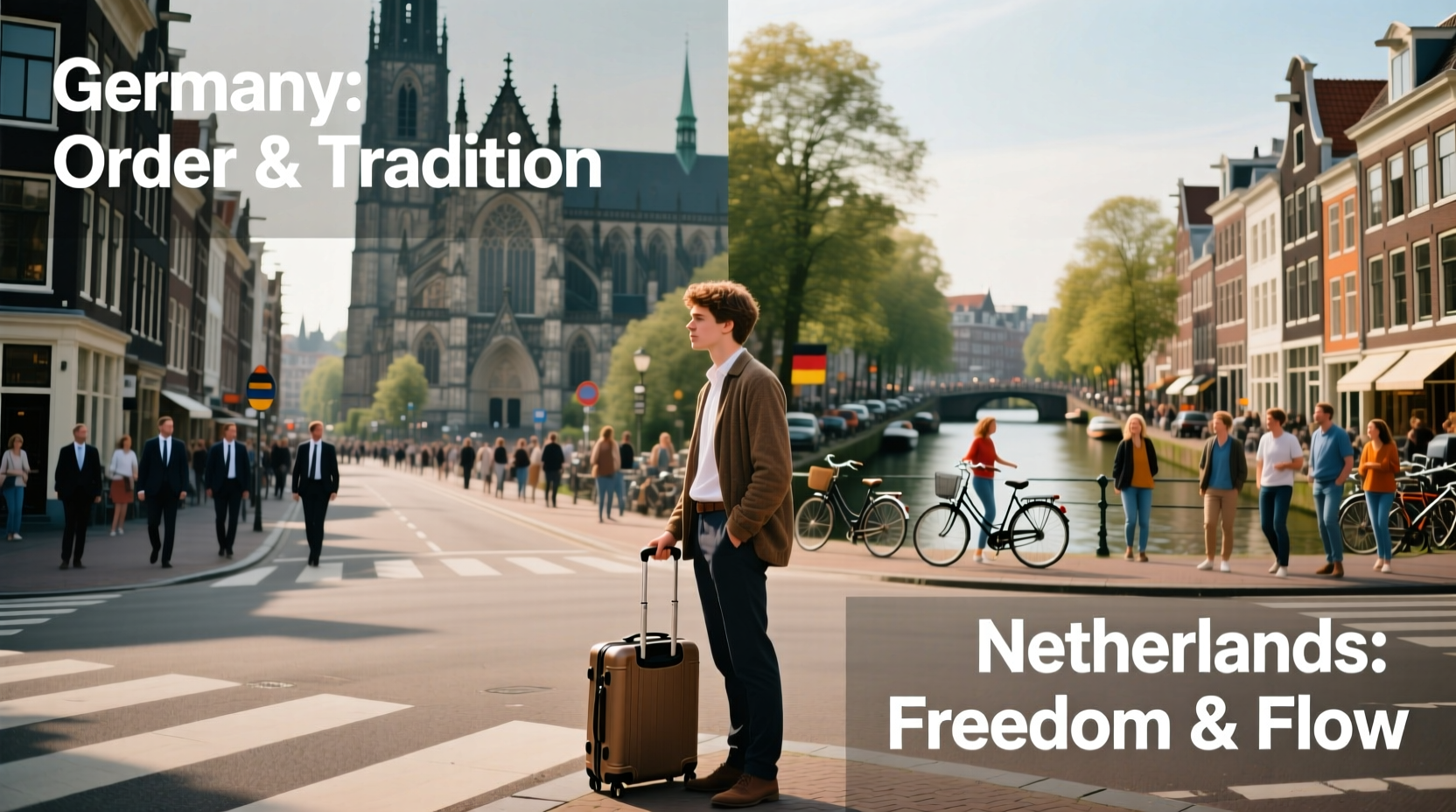For many considering a move within Western Europe, the choice between Germany and the Netherlands often comes down to more than just job opportunities or climate. While both countries offer high standards of living, strong economies, and excellent infrastructure, the cultural, linguistic, bureaucratic, and social nuances can significantly impact your day-to-day life as an expatriate. Understanding these differences isn't just about preference—it's about preparation. Whether you're relocating for work, study, or lifestyle reasons, knowing what sets Germany apart from the Netherlands can help you make a more informed decision and ease your transition.
Cultural Mindset and Social Norms

The Dutch and Germans may share a border and some historical ties, but their cultural attitudes diverge in subtle yet impactful ways. The Netherlands is known for its directness—often blunt—and progressive social values. Open discussions about politics, religion, and personal matters are common, even among acquaintances. This candor is generally not meant to offend; it’s seen as a sign of honesty and efficiency.
In contrast, German communication tends to be formal at first and highly structured. Politeness is rooted in precision and respect for hierarchy. Germans value punctuality, privacy, and clarity. Small talk is less common in professional settings, and building trust takes time. As one Berlin-based relocation consultant puts it:
“Dutch openness can feel refreshing, but German thoroughness ensures fewer misunderstandings. Neither is better—just different.” — Lena Meier, Cross-Cultural Integration Advisor
Social integration also varies. In the Netherlands, English proficiency is nearly universal, especially in cities like Amsterdam and Rotterdam. Expats often find they can live comfortably without learning Dutch. In Germany, while many professionals speak English, daily life—from dealing with landlords to visiting the doctor—requires at least basic German. Relying solely on English limits long-term integration and access to services.
Bureaucracy and Administrative Processes
If there’s one area where the two countries feel worlds apart, it’s bureaucracy. The Netherlands has streamlined many administrative processes through digital platforms like DigiD, making tasks such as registering your address, applying for healthcare, or filing taxes relatively straightforward.
Germany, by comparison, maintains a more decentralized system. Each Bundesland (federal state) and even individual cities may have slightly different procedures. Registering your residence (Anmeldung) is mandatory within two weeks of moving in, and failure to do so can result in fines. Unlike the Dutch equivalent, this process often requires an appointment, printed documents, and sometimes even proof of tenancy signed by your landlord.
Healthcare enrollment, tax registration, and opening a bank account typically require in-person visits and certified translations of documents. The German system prioritizes completeness over speed, which can frustrate newcomers used to digital convenience.
Key Differences in Bureaucratic Experience
| Process | Netherlands | Germany |
|---|---|---|
| Residency Registration | Online via DigiD or in person (same day) | In person only, appointment required |
| Bank Account Opening | Possible online with ID & BSN | Usually in person, may require Meldebescheinigung |
| Tax Number Issuance | Within days via mail | Takes weeks; tied to Anmeldung |
| Language Requirement | Rarely needed for expats | Basic German often essential |
Cost of Living and Housing Market
Both countries face housing shortages, particularly in major urban centers, but the dynamics differ. In the Netherlands, rent prices in Amsterdam and Utrecht have skyrocketed, with fierce competition for rental properties. Social housing is subsidized but largely inaccessible to expats without permanent residency.
Germany, especially in cities like Munich and Frankfurt, also faces high demand. However, rental laws are generally more tenant-friendly. For example, rent increases are capped and must follow local benchmarks (Mietspiegel). Long-term leases are common, and eviction is rare without legal cause.
When comparing overall costs:
- Groceries and public transport are slightly cheaper in Germany.
- Dining out and entertainment tend to be more affordable in Dutch cities.
- Utilities in Germany can be higher due to energy structure and heating demands.
- Income tax rates are comparable, but Germany offers more deductions for work-related expenses.
One notable advantage in Germany is the availability of Werkstätten (company housing) or employer-assisted relocation packages, especially in tech and engineering sectors. The Netherlands offers fewer such benefits, leaving expats to navigate the market independently.
Work Culture and Professional Environment
Work-life balance exists in both nations, but the interpretation varies. The Dutch ideal is leven en laten leven—live and let live—with flexible hours, remote work options, and generous vacation allowances. Meetings start on time and end promptly. Hierarchies are flat, and junior employees are encouraged to voice opinions.
German workplaces emphasize structure, expertise, and long-term planning. Decision-making is thorough and consensus-driven, which can slow progress but reduces errors. Titles matter—being addressed as “Herr Doktor” or “Frau Professor” is standard in formal contexts. Overtime is uncommon; once the workday ends, personal time is respected.
A mini case study illustrates this difference:
Integration and Daily Life
Adapting to daily routines reveals deeper contrasts. Cycling culture is strong in both countries, but Dutch cities are designed around bikes—segregated lanes, ample parking, traffic signals for cyclists. German cities support cycling but prioritize cars in many areas, especially outside Berlin and Freiburg.
School systems differ too. The Netherlands tracks students early into academic or vocational paths, while Germany does so even earlier and more rigidly. Parents relocating with children should research school options thoroughly, as international schools are costly and often require waiting lists.
Religious and secular norms also vary. The Netherlands is one of the most secular countries in Europe, with religion rarely influencing public life. Germany, while largely secular, maintains church taxes and visible religious holidays. Sunday closures are stricter—most shops are closed nationwide, unlike in Dutch cities where weekend shopping is normal.
Step-by-Step Guide: Preparing for Your Move
- Research visa requirements: EU citizens face minimal barriers; non-EU nationals need job contracts and residence permits.
- Secure housing: Use local platforms like ImmobilienScout24 (Germany) or Funda (Netherlands).
- Learn the language: Enroll in online courses (Goethe-Institut or NT2 for Dutch).
- Register upon arrival: Complete Anmeldung (DE) or Registratie (NL) within two weeks.
- Open a bank account: Bring passport, visa, and proof of address.
- Enroll in healthcare: Public insurance is mandatory in both countries.
- Join expat communities: Attend meetups or Facebook groups for support.
Frequently Asked Questions
Is it easier to find English-speaking jobs in Germany or the Netherlands?
The Netherlands leads in English accessibility across industries. While Germany’s tech, automotive, and research sectors use English extensively, daily operations outside multinational companies usually require German.
Can I drive in Germany with a Dutch license, or vice versa?
Yes, EU/EEA licenses are valid in both countries. Non-EU licenses may require exchange after a certain period, depending on origin country agreements.
Which country is more family-friendly?
Both offer excellent parental leave and childcare, but the Netherlands provides more flexible part-time work options for parents. Germany offers larger housing units and greener suburban environments, beneficial for growing families.
Final Thoughts: Making the Right Choice
Germany and the Netherlands are both outstanding destinations for expats, but they cater to different lifestyles and expectations. If you value linguistic ease, fast digital services, and a liberal, informal society, the Netherlands may suit you better. If you appreciate order, structure, stronger tenant protections, and a deeper immersion into European language and culture, Germany offers rich rewards—for those willing to invest the effort.
The key is not to assume similarity based on geography. These nations, though close, operate on distinct rhythms. Success in either depends less on which is “better” and more on which aligns with your personality, career goals, and vision for daily life.









 浙公网安备
33010002000092号
浙公网安备
33010002000092号 浙B2-20120091-4
浙B2-20120091-4
Comments
No comments yet. Why don't you start the discussion?